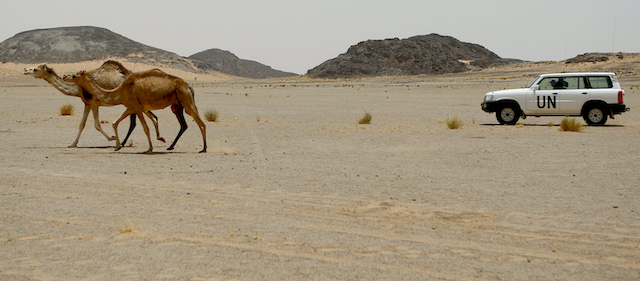Updated
Western Sahara Update – Robert M. Holley

A team from the UN Mission for the Referendum in Western Sahara (MINURSO) pass dromedaries as they conduct a ceasefire patrol and monitor for illegal movements near the border with Mauritania. UN Photo/Martine Perret
Robert M. Holley
October 31 , 2019

Robert M. Holley, Senior Policy Adviser, MACP
Yesterday, October 30, the United Nations Security Council voted to renew its peacekeeping mission in Western Sahara, MINURSO. The renewal broke with the recent practice of shortening the mandate and extended MINURSO for another 12 months. There was no human rights monitoring mechanism added to the mission.
Readers who have followed my recent blogs in this space on Western Sahara may recall that I noted in my last article that it would be worth paying attention to whether the Security Council opted for a longer extension to the mission’s mandate, rather than the six-month period that has characterized the last few renewals.
The yearlong extension would seem to signal that the much-touted “new momentum” generated by former Personal Envoy Horst Kohler and US National Security Advisor John Bolton has now fizzled out. Five months after Kohler’s resignation for health reasons and the absence of John Bolton in the US Government serving as a driving force behind the need for “urgency” on the issue seem to have resulted in the Western Sahara question drifting back to the status quo ante. That is to say, a return to stalemate.
The Secretary General, in his report to the Security Council earlier this month, expressed his hope that the “momentum” allegedly gained by bringing all the Parties (Morocco, Algeria, Mauritania and the Polisario) together for two round table discussions in Geneva could be maintained once a new Personal Envoy is appointed. But five months after Kohler’s resignation it does not seem that the Secretary General has made much progress in finding a suitable candidate for the position. Given the many and repeated failures of previous incumbents in the job and the continued unwillingness of any of the Parties to adjust their positions on the issue, it is not surprising that viable new candidates are likely few and far between. It is also difficult to imagine that any progress can be made on this issue without a dynamic new Personal Envoy and a willingness on the part of the Security Council to break with a process that has been content with the status quo for years.
This issue has vexed the international community since 1975. It has been vexing the Security Council specifically since 1991 when the UN managed to broker a cease-fire between Morocco and the Algerian-backed Polisario Front. In 1991 the United Nations put in place the MINURSO mission to oversea what it too optimistically hoped would be a vote on the future of Western Sahara – either independence or full integration into the Kingdom of Morocco. That arrangement quickly fell apart over endless disputes among the Parties over who should be allowed to vote.
It was not until 1999, after eight years of arguing with the Parties over voter registration issues, that the United States decided enough was enough and broke ranks with the idea of holding a vote. Instead, the US proposed solving the issue through a political compromise that would leave Morocco sovereign in Western Sahara but grant the region a broad autonomy to govern its own everyday affairs.
Following the revelation of this made-in-Washington idea, there was a brief period of optimism that a solution might actually be possible. But, after two mutually exclusive and contradictory autonomy proposals from then Personal Envoy and former US Secretary of State James Baker failed to gain consensus either among the Parties or within the Security Council, all sense of optimism evaporated. Instead, Washington and others on the Security Council settled for a long period of simply trying to manage the dispute in a way that simply preserved the status quo in the region and prevented any renewal of hostilities. This has been the approach that has prevailed since Baker’s resignation in 2004. Fifteen years later, after a brief moment of optimism generated by Horst Kohler (unfounded in my view) we are apparently back where we started in 1999.
I have expressed this view repeatedly, over the last decade or more, that no progress will be forthcoming on this issue until the Security Council comes to a consensus over the broad outline of a viable political compromise and makes clear to all of the Parties that no other solution is possible. Until then, the best we can hope for is continued management of the issue in a way that at least keeps the peace. Morocco, Algeria and the Polisario will continue their war of words and seek marginal advantages among Security Council members and elsewhere in the international community. And the Western Sahara stalemate will continue to vex issues of regional stability in North Africa and prevent the Maghreb from achieving the progress that would otherwise be possible, especially in terms of mutually beneficial regional economic integration and development.
Washington came to this conclusion itself in 1999, then failed to follow through on its implementation through both inattention and a lack of political will to take even minimal risks to support its own policy. Leadership is what is lacking here. In theory, Washington could provide that leadership once again, but given the disarray in American foreign policy these days, that might also to be too much to hope for at the moment.